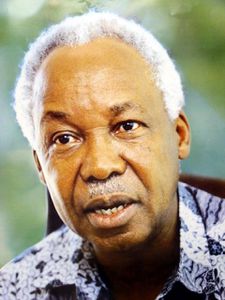Matthew 3, 17: Baptism as a tool promoting freedom and dignity
to use without restraint
Child of one’s surrounding or child of one’s God?
It is the story of an eagle egg which one day fell down from its nest. A passer-by picked it up, as it was untarnished and still warm, and had the strange idea to place it in the midst of eggs that a hen was by then still brooding. The eggs, those of the hen and the one of the eagle hatched in the same time. The baby eagle very soon started to imitate what was going on around him, and adjusted to the ways of being a chicken.
Thinking he was one of them, he never learnt how to fly.
The apostolate of Jesus started when he was about 30 years old, with the event of his baptism. But do we ask ourselves what was his life like before that? The evangelist Matthew places Jesus’ baptism in the chapter 3 of his book that is just following the preaching of John the Baptist and the mention of the Jesus’ stay in Egypt as a political refugee, as Herod looked for killing him.
When a child or a human being is obliged to run away from his village or from his country in order to safeguard his life: what are the consequences? Often, this person is compelled to ask himself: why are we looking for killing me and my family? Do I not have a position, a space in this world? Do I not have a contribution to make to the building of society? What are the price and the value of my life that nobody cares to protect? These questions are so many heavy psychological wounds that endanger self-confidence and normal human development of the concerned person and in consequence limit its contribution to society.
Indeed, Jesus shared the painful quality of being a political refugee, but it does not seem that he was ever carried away by all these burdensome consequences in his spirit. No, he did not absorb all these messages of self-doubt on one-self that was so much cried out by his situation. He did not welcome in one go all what was his surrounding saying, together with the political authorities of his time. He was not like our young eagle which never learnt how to fly. What was his secret?
It is the one of his baptism.
Indeed, during the event of his baptism, ‘a voice spoke from heaven, “This is my Son, the Beloved, my favour rests on him”, (Matthew 3: 17). It is a speech which is radically contrary to the ones of Jesus’ immediate environment, and yet it is a speech that he cares for. It is the discourse of his Father that allows him to be what he is and what he will become. Whenever Jesus listens and obeys this voice, it is a bit like as if our young eagle would now cease to stare at the chickens which are around him in order to watch the proud birds flying very high in the sky. And he starts dreaming and desiring to become like them.
He finds back his true nature and everything becomes possible again.
Baptism is not simply for Jesus. It is for every one of us, in order to remind us that it is not always appropriate to accept ambiguous and often devaluating messages we meet around us. Baptism is an instrument for the promotion of freedom and dignity, delivered once and for all so that we may understand all what we may able to become. Before baptism, we may be condemned to just repeat what others are offering us, condemned to be child and instrument of our surrounding. But after baptism, choice and possibilities are given to us to become child of our God who already choose us and whom we may decide to contemplate in prayer.
People who are travelling often come to realise how much we are very depending on what is offered by our immediate environment, by the society in which we are placed, with its specific mentality, values and ideas. What would I have become would I have been born in another country and another culture?
And in the same way, we may ask ourselves: what could I become if I would decide to listen to this voice which was conferred to me the day of my baptism?

The Baptism of Jesus according to a fresco found in an Orthodox Church in Bethphage, Holy Land
“Go quietly among all the noise and haste,
and please remind yourself,
That peace may well be found in silence.
(...)
Be yourselves.
(...)
You are a child of the universe;
No less than the trees and the stars,
you have the right to be here.
And whether you understand it clearly or not,
the universe unfolds just as it must.
Be in peace with God,
whatever idea you may have about Him;
And whatever are your endeavours and dreams,
In the midst of all the noisy unrest of life,
Please keep peace in your soul.
Despite all its perfidies,
its burdensome works and broken dreams,
The world remains beautiful.
Listen and care for it.
Do you best to be happy”.
Unknown author (1692)
(My own translation)








